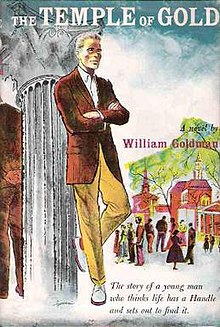Background
The novel was written in three weeks over the summer he graduated from college, in June–July 1956. [1] Goldman had never written a novel before, but had several years experience writing short stories, though none had been published.
The title Temple of Gold was taken from the film Gunga Din . [2] Another influence on the book was the novel Bonjour Tristesse . [3] Goldman had recently done military service and met a man who had an agent. He sent the novel to the agent, and through him got representation from Joe McCrindle. McCrindle sent it to Knopf, who accepted it for publication. [4] [5] Goldman said Knopf:
Wanted me to double it in length and I didn't know what to do about that... That's still the most amazing thing I've ever heard any young writer be told. I was able to do it through some kind of madness but, Jesus, it's an insane thing for an editor to say. [6]
Goldman says he has "no idea why" Knopf accepted the novel "but one of the things that happened, there was an interest in publishing books by young writers and I was one of those writers who basically got picked up along with it." [7] Goldman later reflected:
I never would have continued as a writer if The Temple of Gold had not been taken by the first publisher I sent it to. I'm not that masochistic. There was no way I was going to write anymore. I didn't know that then, but I know it now. There was no encouragement; no one ever said I had any talent. I had never written anything much over two pages long. I had done badly in school in terms of writing. I did not want to be a failure, but I did not have the courage to write a second book if the first had not been accepted. [8]
A 2001 Ballantine paperback edition of the novel included as an afterword a first chapter removed by Knopf. [9]
This page is based on this
Wikipedia article Text is available under the
CC BY-SA 4.0 license; additional terms may apply.
Images, videos and audio are available under their respective licenses.
